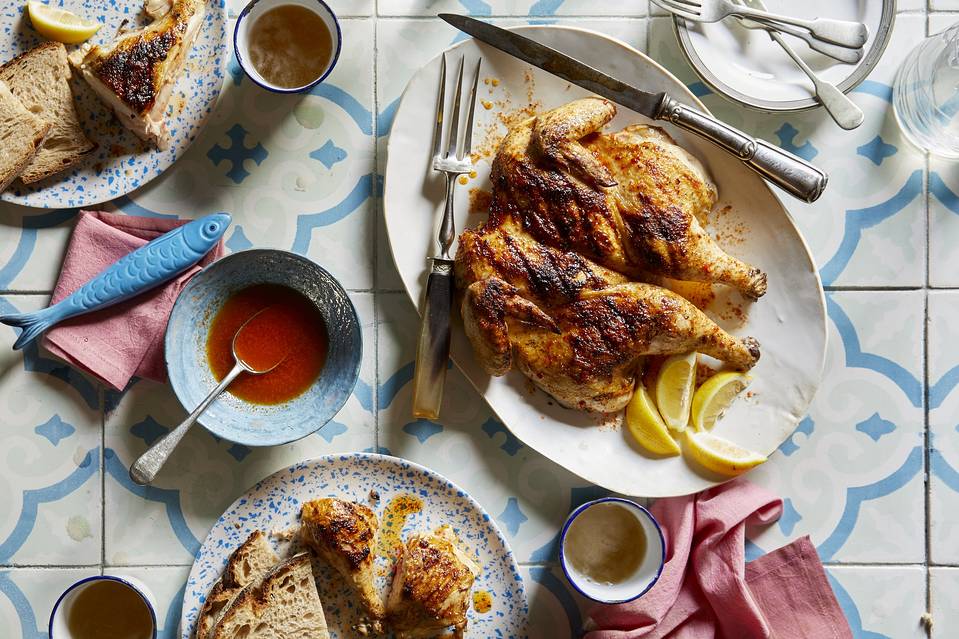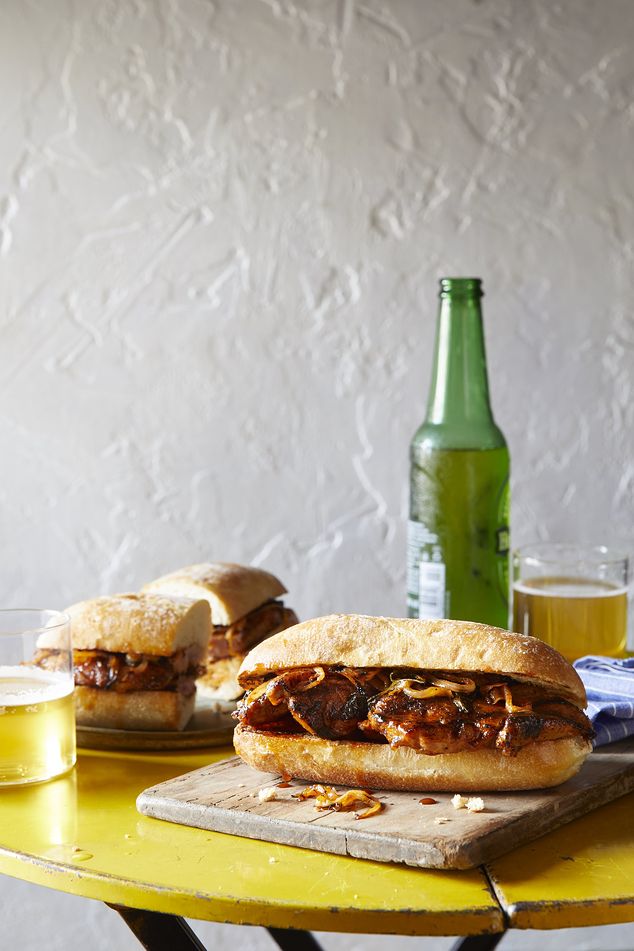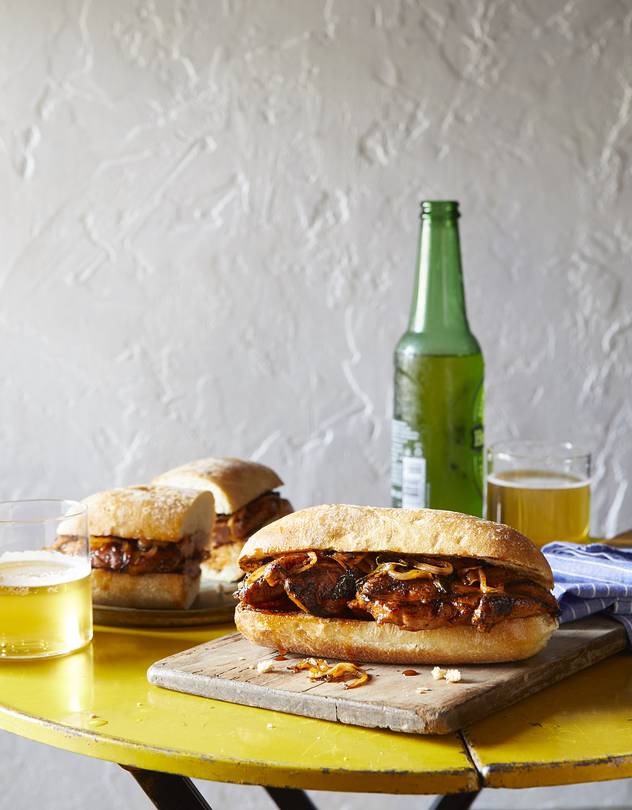
The Best Fall Grilling, Portuguese-Style
Portugal’s vibrant grilling tradition perfectly bridges the transition from summer to fall. Simple recipes produce hearty, boldly flavorful piri piri chicken and grilled bifana sandwiches

BRUSH WITH GREATNESS Basting with piri-piri hot sauce, whiskey, brandy and butter gives this chicken crisp skin and robust flavor. Photo: Kate Sears for The Wall Street Journal, Food Styling by Jamie Kimm, Prop Styling by Nidia Cueva
By
Matthew Kronsberg
Sept. 27, 2017 1:14 p.m. ET
When chef George Mendes was five, he had his first food epiphany, on a trip from his Connecticut home to his parents’ native Portugal. He and his mother attended a festival on one of the feast days that dot the summer calendar. “I remember open grills of chickens and sausages and bifanas,” he said, referring to the pork-cutlet sandwiches as ubiquitous in Portugal as burgers are in the U.S.
“My mom lost me,” said Mr. Mendes. “Apparently, I got a hold of a plate of sardines, took off and sat on a tree stump off on the side, eating them. The combination of the charred skin, lemon and oily fish was kind of an awakening for me.”
Portuguese grilling has that effect on people. It had that effect on me (at a considerably more advanced age) on a recent trip to Portugal; it fires up diners at Lupulo, Mr. Mendes’s Manhattan restaurant inspired by the cervejarias (breweries) of Lisbon; and it can do the same in a backyard most anywhere.

Bifana sandwiches Photo: Kate Sears for The Wall Street Journal, Food Styling by Jamie Kimm, Prop Styling by Nidia Cueva
“We’re not like the Argentinians that cook big pieces of red meat all the time,” said José Avillez, Portugal’s best known chef, whose 10 restaurants include four in the emporium-like Bairro do Avillez. “We’re more in the chicken business and the seafood business, in terms of cooking with fire.” Radically simple and given to bold, hearty dishes, this style of grilling is particularly well suited to this time of year, when a chill is creeping into the air but you’re not nearly ready to give up on the grill.
When I visited the Portuguese city of Matosinhos, just north of Porto, the town’s portside restaurants were thronged with families from around the region, drawn in by displays of the local catch on ice, waiting to be cooked on curbside grills.
I saw no special equipment being used, no equivalent to Argentina’s parrillas. And no flavor-defining wood like hickory or post oak smoldering away; seemingly every grill in Portugal had a sack of Cuban lump charcoal beneath it.
It was grilling more or less as you know it, but somehow better. On a side street, the smell of smoke led me to peek into a hollowed out, roofless rowhouse. Inside the ruin, two cooks worked at rusted iron grills tending silvery fresh sardines flecked with coarse salt, whole sole, dorade and cuttlefish the size of small footballs. A silver-haired man in a pink polo shirt would walk in periodically and issue orders, then collect plates of cooked fish, which he carried across the street to patrons of Restaurante Teresa.
After a few minutes of watching the cooks work, I followed him, took a table in the restaurant and ordered an imperial of Sagres beer, codfish salad and a plate of sardines. Plump, rich and well charred, the sardines needed only a generous squeeze of lemon and a drizzle of olive oil.
Satisfying as this was, it was not my only lunch that day. On the drive back to Lisbon from Matosinhos, I turned off the highway toward the coast and the city of Aveiro. At O Telheiro, a rustic restaurant just across from the city’s glass-walled fish market, I found a seat on one of the heavy wood stools at the bar. It was the end of service and the restaurant was almost empty. The chef, Licinio Simões, was at the grill. I sat at the bar and ordered the octopus.
When Mr. Simões brought it to me, he stuck around to talk for a few minutes, about the 15 years he spent cooking in the U.S., starting with a stint in Newark, N.J., whose Ironbound district is one of this country’s most venerable Portuguese neighborhoods. He asked if I wanted to stay while he made a between-shifts meal for the staff—his take on what is perhaps Portugal’s most famous grilled dish, piri piri chicken.
The dish gets its name from the small, red and fiery piri piri peppers that go into the basting sauce. Mr. Simões’s version bolsters a hot sauce base with garlic, white wine, brandy and whiskey, all emulsified with a generous amount of butter.
“It’s too spicy to go on our menu here,” he said as he handed me a chicken thigh, hot off the grill. “I hope it’s ok for you.” It was more than ok. I wanted to go find a tree stump and be by myself for a while.
Piri Piri Chicken
_Piri piri sauce can be found at many supermarkets or online atzingermans.com. _
Total Time: 1½ hours Serves: 4-6
- 1 stick unsalted butter
- 1 tablespoon finely minced garlic
- 2 teaspoons of chicken base, such as Better Than Boullion
- ½ cup of piri piri sauce
- 1 cup white wine
- 1 tablespoon brandy
- 1 tablespoon whiskey
- 4 Cornish game hens or 2 small chickens, spatchcocked (For directions on how to spatchcock a chicken,see here.)
- Coarse sea salt
1. In a small saucepan over medium heat, melt butter. Add garlic and sauté 1 minute. Stir in chicken base and piri piri, increase heat to medium-high and bring to a boil. Add wine, brandy and whiskey and simmer to cook off alcohol, 3-4 minutes.
2. Pour sauce into a large bowl and whisk vigorously until sauce is at room temperature and butter is emulsified, about 10 minutes.
3. Light a grill. 10 minutes before grilling, sprinkle poultry on both sides with coarse sea salt. Place birds on grill, skin-side down, and brush with sauce. Cover grill and cook 5 minutes, then flip birds and baste again. Cover grill and cook, basting every 5 minutes, for 15 minutes. Flip chickens, baste again and cook, uncovered, 5 minutes. Flip chickens skin-side up and baste again. Continue cooking, uncovered, until a meat thermometer inserted into thickest part of breast reads 160 degrees, 5 minutes. For Cornish hens, total cooking time should be about 25 minutes; for chickens, 30-35 minutes. Finish by flipping skin-side down and cooking to crisp skin, 2 minutes.

Photo: Kate Sears for The Wall Street Journal, Food Styling by Jamie Kimm, Prop Styling by Nidia Cueva
Bifana Sandwiches
Smoke and char from the grill take the bifana, a pork cutlet more often sautéed, to the next level. While the grilled pork is the center of attention here, chef George Mendes is particularly fond of the marinade, which “becomes this messy kind of sauce that’s even great on the bread alone.”
Active Time: 30 minutes Total Time: 5 hours (includes marinating)
- 4 (¼-inch thick) pork loin cutlets (about ¼ pound each)
- ½ cup extra-virgin olive oil
- ½ cup Vinho Verde
- 1 tablespoon sweet smoked paprika
- 1 small onion, thinly sliced
- 4 cloves garlic, thinly sliced
- 4 sprigs parsley, torn
- 4 Portuguese or other crusty rolls
- Salt and freshly ground black pepper to taste
- 1 lemon
1. Make marinade: In a large bowl, combine wine, oil, onion, garlic, paprika and parsley.
2. Pound pork cutlets to ⅛-inch thick. Add cutlets to marinade. Transfer to refrigerator and let marinate at least 4 hours and ideally overnight.
3. When ready to grill, remove cutlets from marinade, wiping off any excess and reserving marinade. Season cutlets with salt and pepper to taste.
4. Transfer reserved marinade to a sauté pan and set over medium-high heat on the stove or on the lit grill. Add ½ teaspoon salt and simmer until reduced by half, about 15 minutes.
5. Grill cutlets over medium-high heat, 2 minutes per side. Add cutlets to sauté pan with marinade, turning to coat. Reduce heat to low or move pan to a cool part of grill to keep warm.
6. Split Portuguese rolls and toast, cut-side down, on the grill. Spoon generous portions of warm marinade onto rolls and fill each roll with a grilled cutlet. Finish cutlets with a squeeze of lemon and serve.
—Adapted from Licinio Simões of O Telheiro, Aveiro, Portugal
